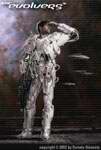| |
Site Navigation
Main
News
Forums
Games
Games Database
Top 100
Release List
Support Files
Features
Reviews
Previews
Interviews
Editorials
Diaries
Misc
Download
Gallery
Music
Screenshots
Videos
Miscellaneous
Staff Members
Privacy Statement
|
|
IGN.PC has posted the story of Rubi-Ka (well, at least the prologue and the first chapter). This is intended to add some depth to the gameplay in AO, and will most certainly be the source for some game developments and questing in the game. So, if you have a game account with AO (or if you are just bored), head over and read. Here's the first bit of it:
Prophet Without Honour
Anarchy Online Book One
by Ragnar Tørnquist
© FUNCOM 2001
"And he dreamed, and behold a ladder set up on the earth, and the top of it reached to heaven: and behold the angels of God ascending and descending on it."
- Genesis 28:12
"All that we see or seem Is but a dream within a dream."
- Edgar Allan Poe
Prologue
Rubi-Ka, 29475 AD
The gleaming towers of Omni-1 reflected the fiery maroon light of twin suns succumbing to distant sandstorms, red dust stirred up by incessant winds along the arched horizon hundreds of miles due north.
Large flotillas of ships passed north and west, rising slowly like gray whales drifting to the ocean surface, seeking to avoid the storms by crossing over them. To the east, there was the faint silvery gleam of another flotilla returning from the mines.
While the storms were still much too remote to be heard – even with the most sensitive of implants – Philip Ross felt them. Rubi-Ka was, after all, his world. Not a sparrow would fall to the ground without him knowing.
Figuratively speaking, of course. There were no sparrows on this planet. Ross focused. The windows darkened, and the panorama before him grew dim, leaving his office in a comfortable gloom.
The office was located on the top floor of one of Omni-Tek's most imposing and heavily fortified towers in the capital city. It encompassed a sprawling circular expanse Ross privately thought of as his private Coliseum, and though it lacked lions and gladiators, it had the desired effect on his subordinates and colleagues.
It intimidated them. They were impressed with size. Size meant power. His office made them feel small, smaller than him. And everything about Philip Ross was big.
|
|
|





 AO Story at IGN.PC
AO Story at IGN.PC